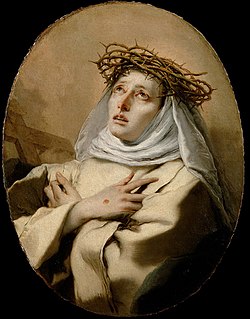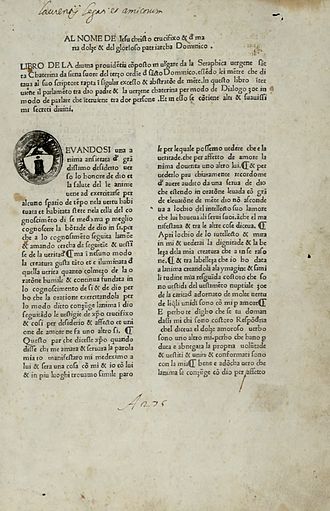Catherine of Siena
Saint Catherine of Siena (March 25, 1347 – April 29, 1380) was a saint. She was born in Sienna and died in Rome. She promoted peace in Italy and is one of the two patron saints of Italy; the other being Saint Francis of Assisi[1][2]
| Saint Catherine of Siena | |
|---|---|
St. Catherine of Siena, by Giovanni Battista Tiepolo | |
| Virgin; Doctor of Church | |
| Born | March 25, 1347, Siena, Republic of Siena |
| Died | April 29, 1380 (aged 33), Rome, Papal States |
| Venerated in | Roman Catholic Church; Anglican Communion; Lutheranism |
| Canonized | 29 June 1461 by Pope Pius II |
| Major shrine | Santa Maria sopra Minerva, Rome and Shrine of Saint Catherine, Siena |
| Feast | April 29; April 30 (Roman Calendar, 1628–1969) |
| Attributes | Dominican tertiaries' habit, lily, book, crucifix, heart, crown of thorns, stigmata, ring, dove, rose, skull, miniature church, miniature ship bearing Papal coat of arms |
| Patronage | against fire; bodily ills; diocese of Allentown, Pennsylvania, USA; Europe; illness; Italy; miscarriages; people ridiculed for their piety; sexual temptation; sick people; sickness; nurses |
She was born Katerina de Benincasa in western Italy, the 25th of 25 children. She was born at the time of the Black Death, or Bubonic Plague. Although it probably killed many she knew, she herself did not contract the disease and survived the epidemic. She had a twin sister, who died several months later. Her family was part of the lower classes and she did not become literate until 1378.
At the age of six, Catherine had a vision of Jesus Christ. She continued to receive many visions throughout her life. At age 12, Catherine cut off her hair and was obligated to serve her family, living in small quarters in the basement. At the age of 16, she entered the Third Order of Saint Dominic and later became a Dominican nun.
She wrote a book called Dialogue, which taught that if you love your neighbors it is loving God. She also devoted her life to improving the Catholic church, helping the ill, poor, and spiritually underprivileged. Catherine persuaded the pope to return from Avignon, France and back into Rome. She also tried to start a new Crusade to the holy land, Jerusalem. She died of “holy anorexia”, as she ate very little in the name of God. She became a saint in 1461, and was later made a Doctor of the Church in 1970 by Pope Paul VI and a patron of Europe in 1999.[3][4][5]
References
- ↑ Gardner, Edmund. "St. Catherine of Siena." The Catholic Encyclopedia. Vol. 3. New York: Robert Appleton Company, 1908. 30 Jan. 2013
- ↑ St. Catherine of Siena at the Catholic Encyclopedia
- ↑ Harran, Marilyn J. "Catherine of Siena, Saint." World Book Advanced. World Book, 2013. Web. 27 Feb. 2013.
- ↑ Wilson, Norman J, Ed. "St. Catherine of Siena." World Eras. Vol. 1: European Renaissance and Reformation, 1350-1600. Detroit: Gale Group, 2001.
- ↑ Biography In Context. Web. Feb 27, 2013.

